 West Bengal?s first and last NanoAP
West Bengal?s first and last NanoAPEACH year India?s Bengalis celebrate the goddess Durga, offering prayers before dazzling religious tableaux called pandals. This year Santosh Mitra square in Kolkata (formerly Calcutta) hosted an unusual example: a yellow replica of the Nano, the small car touted by Tata Motors as the world?s cheapest. It stood in front of a forlorn factory (pictured), made of plywood, fibreglass and plaster, and girdled by a huge padlock and chain. Alas, the Nano will not be built in West Bengal. On October 3rd Ratan Tata, chairman of the Tata Group, said his firm would abandon its factory in the state, which has been pinned down for months in ?political crossfire?.
The Nano is an icon of Indian ingenuity and entrepreneurialism. Selling for just 100,000 rupees ($2,100), it seeks to reach a new class of customers through frugal engineering. But India?s politicians also have a keen eye for a gap in the market. Mamata Banerjee, leader of the main opposition party in West Bengal, drummed up a campaign on behalf of farmers who opposed the project. Many had refused the compensation the state government offered when it hurriedly expropriated their land to make room for the Tata Motors plant. Whatever the justice of its cause, the campaign became shrill and intimidating. It has undone West Bengal?s efforts to court industrial investment, and may have done wider damage to India?s reputation. If the Tatas, one of India?s most venerable business houses, cannot build a factory without political grief, why should foreign investors take the risk?
Farming accounts for less than 18% of India?s output, but carries far greater political weight. The difficulty of acquiring land, which is often either treasured by farmers or hoarded by the state, has become a constraint on India?s growth. Industrialists are converting over 466,000 acres into business-friendly ?special economic zones?. But not without fuss. In Maharashtra the government should soon release the results of a farmers? referendum on a project outside Mumbai championed by Mukesh Ambani, head of Reliance Industries, India?s biggest company by market capitalisation. In Goa the government renounced all such zones amid popular concerns about the changing character of the state.

